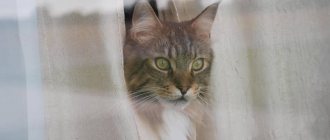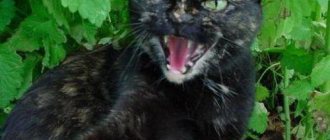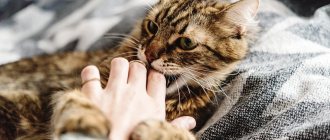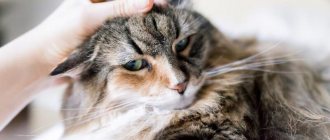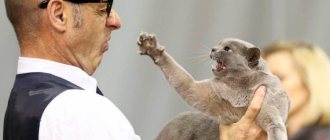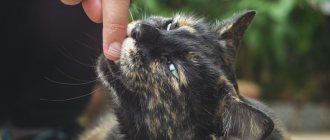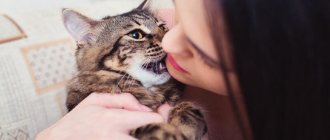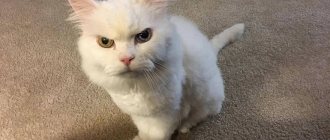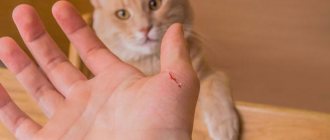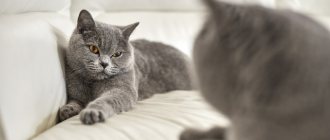The breed standard describes the Maine Coon as an affectionate and obedient cat. But, despite the fact that several generations of big cats live happily next to people, the animal has retained the habits of a predator. An angry Maine Coon can pose a serious threat to humans.
Let's find out what the cause of aggression is and how to properly raise a cat so that it does not bite.
Maine Coon temperament and types of aggression
The ability of cats to adapt to any conditions is one of the main reasons why they were able to survive in ancient times. The Maine Coon is an excellent example for this situation. The breed was formed in unfavorable conditions and managed to conquer indigenous territory.
Read also: Why you can’t kiss on the forehead?
Cats are widely recognized for their highly developed hunting instincts.
The Maine Coon's reaction to external stimuli depends on the type of its temperament. Among the representatives of this breed, phlegmatic and sanguine people are most often found. Such cats quickly adapt to new conditions and are extremely rarely angry.
- The characteristic features of a phlegmatic cat are slowness and calmness. The animal will feel comfortable even in a small apartment. A phlegmatic cat prefers rest to active games and can sleep almost all day.
- A sanguine cat quickly gets used to a new home, gets along easily with other pets and loves children. A Maine Coon with this type of temperament is very curious and active.
The types and reasons for aggression in big American cats also vary.
Who can bite at night? Recognizing an insect by its bite
Bites at night
: If the bites on your body occur at night, then most likely you are being bitten by bedbugs or mosquitoes. In bedbugs, bites are focused in one place and lined up in a line along which the bedbugs walk. It is also important to know that bedbugs may not bite all family members. This may be due to various factors (the presence of outerwear, thinness of the skin). Mosquito bites, on the other hand, are more chaotic and scattered throughout the body.
Night bites of insects and parasites that feed on human blood are by no means a rare occurrence. Pests prefer to become active precisely in the dark and are quite capable of turning a person’s life into a complete nightmare.
Of course, it all depends on the type of attacking parasite and the degree of infection of the premises. Often, bleeding or itchy blisters are attributed to dermatitis and other skin diseases. It is almost impossible to notice domestic pests during the day - fleas or linen lice, just like bedbugs, prefer to sit quietly at this time. But as soon as you go to bed and plunge into sweet dreams, the parasites go hunting. So how can you tell: does a bug bite at night, or is the problem with a completely different pest?
Specialists from the Sanepidemstation.com service recommend: If itchy bite marks appear on your body during a night’s sleep, you should pay attention to their appearance, shape, and location. Remember that unattended infestation of a premises by parasites is especially dangerous for children, pregnant women, the elderly and allergy sufferers.
Causes
Maine Coons may become angry and aggressive due to the following reasons:
If the owner carefully observes his pet, he will be able to determine the cause of changes in his pet's behavior. When a Maine Coon doesn't feel well, it hides so that no one can disturb it.
In this case, you need to seek help from a veterinarian. The sooner a specialist determines the cause of deterioration in health, the more successful the treatment will be.
Maine Coon kittens may bite frequently because they are actively exploring the world around them. Therefore, owners should purchase a scratching post or organize a separate play corner. Active behavior also appears during the change of baby teeth. After changing to native ones, the pet will again become calm and balanced.
Hyperactive behavior manifests itself during puberty, when animals are actively looking for a mate. If Maine Coon owners are not breeders, you should consider spaying or neutering your pet. After the procedure, the Maine Coon will regain calm and balance.
This breed is known for its high intelligence and tendency to learn. If the owner does not want aggressive manifestations in the future, he must educate him. There are several ways to stop your Maine Coon from biting and scratching.
How to stop a Maine Coon from biting - 7 possible causes of pet aggression
Calm adult Maine Coon cats bite extremely rarely, unlike kittens. If the cat begins to bite and scratch not during games or stroking, the owners should take a good look at the pet’s behavior. Perhaps his condition has worsened and he bites to show that he feels discomfort. In this case, you should immediately contact a veterinarian for help.
Temperament and types of aggression of Maine Coons
Its habits, reaction to stimuli and how often it uses its teeth depend on what type the Maine Coon is. According to temperament there are:
The average Maine Coon is most often type 1, type 2, or something in between. In sanguine people, the reflexes of excitation and inhibition are balanced. Phlegmatic people are calmer; they react more slowly to what is happening. Both types adapt well to new situations and people. If a cat is afraid of guests, restless, or overly active, he is choleric. It is more difficult for an inexperienced person to cope with such a temperament. A kitten is born choleric, it is impossible to change the structure of the psyche, but you can instill good manners. You cannot use brute physical force or punish cruelly.
[ads-pc-1] It is normal for a Maine Coon to show aggression in the following situations:
- illnesses, ailments;
- fear, fright;
- in case of violation of territorial integrity (to relatives);
- irritation;
- raising offspring;
- games;
- clarifying the relationship between cats.
It is important to understand that a pet’s behavior is very different from a human’s. If a cat experiences positive emotions from stroking, it may bite as excitement gradually increases. A sick animal, due to poor health, wants peace and tranquility and often goes to a secluded place to lie down. A cat bites when it wants to show that it feels bad, it has little strength, and there is a need to restore it. A similar reaction to injections, dressings and examinations. In addition, in the veterinary clinic the air is filled with specific odors that the coon is afraid of.
Read also: Why I push people away
Bedbug as a threat
If adult inhabitants of the house or children are bitten by a bug at night, characteristic marks remain on the body, which are quite difficult to confuse with any other skin lesions. The track of marks predominantly on the back, thighs, and buttocks causes severe itching and becomes a source of irritation. In addition, during its life, the pest emits a very specific odor, by which the appearance of bedbugs can also be detected over time.
It is important to understand: without the use of modern means and technologies for disinfestation, it is impossible to get rid of insects. The life activity of bedbugs does not suggest the possibility of poisoning them through food or water. Blood-sucking insects easily hide under wallpaper, inside furniture, household appliances, and can live in children's plush toys, upholstery, and mattresses. The further the situation progresses, the more difficult it will be to completely get rid of pests. And only professionals have available drugs and technical means that can radically change the situation.
What should I do to wean myself off?
To wean your coon from biting, maintaining the following rules will help:
- Do not use body parts in games.
- Provide the animal with a sufficient number of toys.
- Punish for biting and scratching.
- Allow dynamic entertainment.
- Adopt a kitten from a breeder from 12 weeks of age;
- Provide a balanced diet.
Return to contents
Raising a cat
An experienced cat breeder carefully selects the animal, taking an interest in its ancestors and habitat.
An adult cat is capable of making his own rules. Often this only happens at the beginning. With a neutered Maine Coon or kitten, such nuances are excluded. If a coon attacks, you need to punish him: lightly hit him, shake him by the withers, or press him to the floor. It's important not to overdo it. After this, aggressive pets are not given attention for 30 minutes. Biting games are ignored. If there is excessive activity and there are no contraindications, the veterinarian offers a mild sedative so that the adult uncastrated cat does not bite the newly arrived kitten. Therefore, before adaptation, it is important to pay due attention to cats. If you suppress impulses of aggression and gradually accustom cats, the Maine Coon will not be able to bite the baby.
The Maine Coon has a friendly character and should not show aggression towards humans, but it is a predator and some habits have been preserved since ancient times. The breed standards describe the ideal cat; in real life, each individual is individual. Their behavior is a reflection of genetics, upbringing and life lived. Many owners are faced with the fact that their pet bites. You should not make hasty conclusions, but rather find out about the possible reasons.
What to do if you are bitten by an insect?
The discovery of itchy bites on the body requires immediate action. The first thing to remember: sanitization - hydrogen peroxide and other disinfecting solutions will help avoid infection. To prevent the development of allergic reactions, you should take an antihistamine. If an independent study of your home does not provide clear information about which insect has become the source of problems, do not hesitate. Employees of the Sanepidemstation.com sanitary service will help identify the source of the lesion and offer modern means of combating the source of danger. All work is guaranteed to prevent re-infection of the property.
Our specialists will call you back in 5 minutes!
Source
Character traits
The American breed of Maine Coon cats is one of the most unique and extraordinary. The cats are distinguished by their luxurious, large dimensions, the weight of which can reach up to 12 kg.
The animals have an excellent appearance, long thick hair of various colors, an extremely fluffy tail, a massive elongated head, large triangular ears with tassels, expressive eyes and muscular, strong limbs.
Did you know? The animal's homeland is the United States, namely the northwestern state called Maine. According to one legend, this breed was bred by crossing a cat and a lynx, as a result of which the animal “received” lynx tassels. According to the second legend, the ancestors of the Maine Coon were a cat and a raccoon; as a result of such a union, the pet was awarded the tail of a raccoon. However, scientists claim that the breed appeared as a result of evolutionary changes.
Despite its serious, impressive appearance, the animal has an excellent character, which is not at all similar to the character of traditional cats. The distinctive character traits of the Maine Coon are:
- Restraint and balance. By nature, they are very calm, restrained, almost never show aggression, patient, simple, trusting, sociable, and need to communicate with people. At the same time, cats have a well-developed sense of dignity and self-control, so relationships of the “familiarity” type are unacceptable for them. They can stay near the owner for a long time, but they are unlikely to be allowed to sit on your lap.
- Lack of aggression. The cat almost never shows aggression, anger and does not release its claws. Even during times of severe irritation, the maximum an animal can do is squirm, squeak pitifully, but not scratch. It is thanks to this peaceful and friendly disposition that cats of this breed are most often recommended for families with small children.
- Activity and playfulness. Large, massive forms do not prevent Maine Coons from being more active and playful. They do not belong to the category of “sofa” animals; they prefer to spend their free time playing with a ball or a toy mouse. They need a lot of space for running and little cat "pranks".
Did you know? These cats are endowed with a high level of intelligence and perfectly understand the boundaries of what is permitted. They will never climb onto the dining table without permission, understand the intonation with which they are addressed, do not damage the furniture, etc.
- Friendliness. Animals of this breed have a friendly character, which affects not only their attitude towards people, but also towards other animals. They perceive all living creatures larger than rats well, treat them as comrades, and therefore get along well with other cats and even dogs.
- Tact. Maine Coons are very delicate, they perfectly understand the owner’s mood, do not interfere, are absolutely unobtrusive, know how to adapt to the character of the household, discreetly rejoice at the owner’s return, and love to be close.
- Aristocratic and independent. Cats will never allow themselves to beg for food; they will wait obediently and patiently for lunch. They allow their owners to caress and stroke themselves, but if there is no such desire, you should not pick up the pet, as he will consider this as violence.
Important! All the positive aspects of the Maine Coon’s character can be revealed only with a friendly attitude towards him and intra-family contact with members of the household. If you ignore him, move away from him, he will do the same.
Main character traits
The serious appearance evokes respect and even wariness towards this breed. However, all these prejudices are completely groundless. Under the guise of a formidable hunter hides a kind soul and a calm disposition. You can often hear that coons are atypical felines. This refers to their behavior and habits. The main differences of this cat breed are the lack of selfishness and dislike of loneliness. By themselves, such cats do not like to spend time.
Attitude towards the owner
Maine Coons are very sociable, they love to spend time with their owners, without showing any aggression towards them. As a rule, they choose the main owner for themselves and perceive him as the head of their pride. You should not leave them alone for a long period. Maine Coons try to spend all their time next to a person, but they will not impose themselves. These animals cannot stand familiarity.
Maine Coon and children
These cats become strongly attached to children, to those who often play with them and take care of them.
They behave kindly and friendly with the child, a little condescendingly. When the baby begins to crawl and walk, the cat's behavior may change. She may begin to play with him, and sometimes even show protectiveness. The Maine Coon's activity and friendliness make him a great friend. However, we must not forget that this is still a cat and not a soft toy. He has both claws and teeth.
The task of parents is to teach children to communicate safely with animals. A cat may become aggressive if it is hit, pulled by the tail, or thrown with any objects. But it is not typical for Maine Coons to attack children first.
Attitude towards other animals
The size of the coon allows him to have his own dignity over humans and other animals, including dogs. Because of their friendliness and ability to make contact, they easily get along with the pets they live in the same apartment and form friendly families. Coon cats are willingly involved in caring for their kittens, which is not typical for cats of most other breeds.
"Like a cat and a dog."
Who is the Maine Coon suitable for?
This breed is suitable for almost all people. But you shouldn’t expect excessive tenderness from them. Coons will not sit on laps, and given its size, this is not entirely comfortable for humans. You need to play and spend a lot of time with a cat. Coons are social animals that cannot tolerate loneliness and boredom; those who are constantly on the road should not get them.
“How beautiful is this white color of a cat...”
The pure and innocent white color of a cat symbolizes comfort and regularity. It is preferred by organized and neat people. In ancient times, the Assyrians believed that seeing a snowy beauty in a dream was great luck; good news, reconciliation with enemies and success in business would certainly follow.
But when purchasing a white kitten, you should remember some features that are inherent in most white cats.
A very interesting science is Genetics, in some cases unpredictable, but very exciting. It is not entirely clear how exactly, but the genes responsible for color influence the character and behavior of the cat.
These affectionate and gentle creatures are calm; comfort, coziness, and silence are very important to them. But their main feature is their attachment to the owner, bordering on dependence. Of course, not all white cats are the same. According to ethologists, odd-eyed white cats are unpredictable, easily change anger to mercy and instantly switch from one curious object to another. You can say about them: a mystery cat and a surprise cat. A white cat with blue eyes is an affectionate purr, ready to spend the whole day in the arms of a loved one. Yellow-eyed princesses are full of secrets - sort of sorcerers who see right through everyone.
A snow-white cat, regardless of the color of its eyes, the length and texture of its fur, is always a faithful friend, companion and interlocutor. And of course, for people who do not want to have an affectionate and dependent creature next to them, it is better to turn their attention to other colors.
What are mosquitoes afraid of?
Having determined who might bite in bed at night, you can proceed to active action. If mosquitoes are the source of painful bites in your home or apartment, you can easily solve the problem using a wide range of tools and methods. The most “long-lasting” is the use of ultrasonic electronic repellers. Unlike fumigators, the device can be used throughout the night and does not affect human health.
Simpler and more affordable means are no less popular. Fumigation devices can be designed for use with plates or liquids evaporating from a container. But it is not recommended to leave such a device plugged in for a long time. In addition, you will have to refuse ventilation at night.
This is prohibited
It will not be possible to avoid absolutely all problems when raising a pet, since each Maine Coon is unique, and it is impossible to foresee everything in advance. It is important to know the basic principles of behavior in case of problems and adhere to them:
- The use of physical force is prohibited. You cannot hit a kitten with your hand or any other object; this will lead to the fact that it will not only grow up to be a fearful cat with an unstable psyche, but will also begin to see its owner as an enemy.
- You cannot punish for something that was done a long time ago. If the consequences of a pet’s prank were not detected immediately, then there is no point in scolding him a few hours later - he will not understand what caused the owner’s dissatisfaction.
- Praise more than punish. The kitten should be praised and encouraged even for the most insignificant successes, but scolded only for serious offenses.
It is important for Maine Coons to understand and feel that the owner is, first of all, a friend. In this case, cats try their best to please the owner.
Common problems
The main problems that you may encounter when raising a Maine Coon and how to solve them:
- The cat goes to the toilet in the wrong place - sit the pet next to a puddle, sternly say “No!”, and then take him to the litter box.
- The Maine Coon climbs into places where it is forbidden, for example, on a table - spray water into it from a spray bottle. This action is unpleasant for the cat; it will serve as a kind of stop signal.
- The pet scratches the furniture, ruins the curtains with its claws - use a spray bottle, sternly say “No!”
Also often noted is the tendency of Maine Coons to chew on wires, which can be not only unpleasant, but also dangerous due to the risk of a short circuit. If it is impossible to hide the wiring, you should spray it with citrus juice - this smell is unpleasant for cats.
Basic rules of conduct
If the owner decides to wean the Maine Coon from biting, he must adhere to the following rules:
- no need to allow your pet to play with body parts;
- purchase a sufficient number of special toys;
- All biting and scratching should not be encouraged;
- conduct active games;
- buy a 3-month-old kitten from a breeder;
- take care of a balanced diet.
The main mistake owners make is encouraging pets to play with body parts. The kitten will become a habit of biting and scratching, and later it will be difficult to wean it off. It is worth offering alternative games and accustoming them to affection right away.
To prevent possible diseases, it is necessary to create a balanced diet. If the Maine Coon feels well and is not stressed, he will have no reason to behave aggressively.
How to structure training sessions
The main principle is consistency. Prohibitions and restrictions for kittens should be repeated regularly in a calm and friendly tone. You cannot voice them as orders. A loud or rude voice will also not produce the desired results.
Exercise should take no more than 15 minutes a day. It will be easier and easier if the animal receives a reward upon completion. It is worth stopping the session if the kitten gets angry or you get angry. A positive attitude during training and after it will speed up the learning process.
Education and ways to combat a cat’s bad habit
Firstly, experienced owners carefully choose their future Maine Coon pet. They watch and communicate with the parent couple and the atmosphere in their place of residence. In this way, they find out heredity and provide themselves with a guarantee of getting an adequate animal.
There is such a thing as dominance. An adult Maine Coon can begin to establish his own rules of behavior in the house. This is normal for unneutered cats, but must be prevented at the outset. If your pet came into the house as a kitten, then this is easy to do. A large Maine Coon will resist. You can use the following methods to avoid being bitten:
- Gently slap your nose.
- Take it by the withers and shake it lightly.
- Press down on the floor for a few seconds.
- Ignore half an hour after punishment.
The Maine Coon should not feel pain or get injured. These methods allow you to put psychological pressure on the cat. In this case you cannot:
- Beat the animal.
- Tie down or lock in a separate room.
- Deprive of water or food.
- Spray with water.
- Scare, clap loudly.
The best education is to ignore pranks from an early age. Sometimes it is useful to give herbal medications with a sedative effect if there are no health restrictions. They are prescribed or recommended by a veterinarian.
When an animal attacks, resistance only provokes extreme agitation due to fear. Attacks of aggression are not encouraged; punishment should be immediate. After a while, the Coons will not remember what they did, but the resentment towards the person and misunderstanding will remain. If you follow the rules, this will soon stop.
The breed standard describes the Maine Coon as an affectionate and obedient cat. But, despite the fact that several generations of big cats live happily next to people, the animal has retained the habits of a predator. An angry Maine Coon can pose a serious threat to humans.
Let's find out what the cause of aggression is and how to properly raise a cat so that it does not bite.
Training and communication
Maine Coons are freedom-loving and independent, so you should not expect unquestioning obedience from them. However, this breed can be taught some commands and, more importantly, proper behavior around the house. First of all, it is necessary for the pet to remember its name and associate it with something pleasant, after which more intensive training should begin.
The most suitable way for Maine Coons to learn and consolidate skills is through play.
Angry Maine Coon: why the cat bites, scratches and shows aggression, reasons and methods of education
The breed standard describes the Maine Coon as an affectionate and obedient cat. But, despite the fact that several generations of big cats live happily next to people, the animal has retained the habits of a predator. An angry Maine Coon can pose a serious threat to humans.
Let's find out what the cause of aggression is and how to properly raise a cat so that it does not bite.
Linen lice: how to fight?
Who can bite in bed at night if bite marks are localized in the elbows and under the knees, on the neck, under the chest and other hot spots of the human body? Such traces are left by lice, which differ from their fellows only in that they live and lay eggs not on the body, but directly in the bed itself. It is worth paying attention to the fact that it is almost impossible to recognize the presence of parasites. During the day they are not active. And in the absence of contact with the food source - the human body, insects can easily live without food for many months.
Exterminating pests on your own is a serious problem that can cause a lot of trouble. Of course, you can get rid of all bedding and spend time boiling linen, but without complete sanitary treatment of your home, it will be impossible to guarantee the absence of risks of re-infection.
Aggression in kittens
An affectionate and gentle creature eventually turns into a restless teenager. Small animals learn about the world by testing things out. During the first month, a Maine Coon grows up with its mother and brothers and sisters. They play, biting each other, catching the tail, and the cat teaches them how to hunt and how to stand up for themselves.
When a change of teeth occurs, the owner is guaranteed to have damaged things and barely noticeable wounds. You can teach him to chew special toys, give him small natural sinews, and treats. Then the kitten switches attention, and the process of education begins.
Most often, children's feet suffer from playing. Not everyone goes through this when they grow up, because character and temperament are passed on from their parents. Hyperactivity is a sign of good health and proper development. The kitten learns to interact, tries different forms of communication. He repeats the pattern of behavior in the pride, attacks from secluded places, supposedly tracking down prey.
The older Maine Coon calms down, but puberty brings back excitement and elements of aggression. Castration saves you from possible consequences, since hormones do not give the desired effect. Cats usually outgrow them; a mature individual rarely bites, mainly when he is playing or is sick.
To wean yourself from this habit, experts recommend:
- Do not use arms, legs, or other parts of the body in the game.
- Provide your pet with a variety of toys made from fur, veins, and feathers.
- Punish by lightly shaking the scruff of the neck, as a mother cat does.
- Do not limit the baby's activity.
- Take kittens from the breeders' home after 3 months so that the kitten can communicate correctly with peers and people.
- Balance your diet.
A lack of calcium, for example, disrupts the transmission of nerve impulses. Sunlight promotes the production of vitamin D, which is responsible for growth, bones and cartilage. A kitten with a lack of trace elements will develop health problems, which will affect their behavior.
Why does the Maine Coon bite?
There are not as many reasons for cats to show anger as it might seem at first glance. The most important thing is to understand the origins of the Maine Coon’s discontent and try to avoid the sharp edges of risky relationships in the future.
Fleas: where do they come from?
When a bug bites at night, the location of the wounds on the body clearly indicates their identity. But what to do if a small rash is localized in various parts of the body? First of all, you need to make sure that the small black fleas that pet owners are used to seeing are not jumping on the floor. Contrary to popular belief, they rarely attack humans, preferring creatures with a higher body temperature. But if earthen parasites or their other varieties get into your home, painful bites cannot be avoided.
It is important to understand that the fight against fleas has its own specifics. Insects move quite quickly and lead an active nocturnal lifestyle. And you can recognize them from a photo, distinguishing them from other species, only under a magnifying glass. Regular cleaning, if the number of pests is already off the charts, will not be enough. You will have to use much more intense chemicals.
